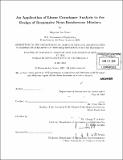An application of linear covariance analysis to the design of responsive near-rendezvous missions
Author(s)
Visser, Benjamin Lee
DownloadFull printable version (11.74Mb)
Other Contributors
Massachusetts Institute of Technology. Dept. of Aeronautics and Astronautics.
Advisor
Piero Miotto.
Terms of use
Metadata
Show full item recordAbstract
This thesis investigates a new class of launch vehicles capable of being released from an aircraft which ultimately have the goal of achieving near-rendezvous conditions at orbital altitudes up to 800 km. These launch vehicles would be capable of carrying small payloads, on the order of two to six kilograms, and would be much more responsive to a customer's needs than the current space launch infrastructure, in which it may take months of preparation for a launch. To fully describe the mission in this thesis, it is broken up into three phases: atmospheric launch, orbit raising, and near-rendezvous operations. An analysis method known as Linear Covariance analysis is introduced to provide a platform of estimating the navigation covariance and dispersion of the spacecraft during the second and third phases, while the first phase, up to main-engine-cutoff, is examined using a three degree-of-freedom simulation. The goal of this thesis is to demonstrate the utility of Linear Covariance analysis to responsive space mission planning. This is accomplished by first explaining the mathematics that underlie the method. Next the software used for the analysis, Lincov Tools, is explained in detail, the mission is examined more closely, and the hardware for both the payload and launch vehicle are briefly discussed. Finally, the combination of the three degree-of-freedom simulation and Lincov Tools are employed to the space mission and the results are presented.
Description
Thesis (S.M.)--Massachusetts Institute of Technology, Dept. of Aeronautics and Astronautics, 2007. Cataloged from PDF version of thesis. Includes bibliographical references (p. 97).
Date issued
2007Department
Massachusetts Institute of Technology. Department of Aeronautics and AstronauticsPublisher
Massachusetts Institute of Technology
Keywords
Aeronautics and Astronautics.